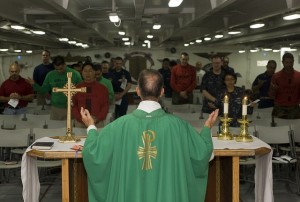Our priest was clearly confused at the Sunday morning Mass. He said the Sign of the Cross twice, sat when he should have stood, got lost during the Consecration, abruptly stopped preaching in the middle of a bewildering homily, and walked past long-time parishioners as if he’d never seen them before in his life.
After Mass, the confused congregation speculated that he was under a lot of stress, he’d been drinking, or that it was something more serious. Because we have friends who work in the parish office, we knew the truth – Father has Alzheimer’s. It was only after he had “blown off” three sick visits to our family last year, and we were hurt and angry to have been treated so badly in our time of great need that our friend on the ministry told us what was really going on. Even though his diagnosis is well over a year old, our priest is either too embarrassed to admit that he is ill, or is hoping to be able to manage the disease’s progression privately. The problem with his desire for privacy is that his parishioners are getting hurt and offended because of his silence.
A friend of mine told me a similar story of her priest who abruptly stopped doing anything which required him to leave the parish or rectory. He began sending priests from nearby parishes to sick-calls, last rights, and house blessings. This formerly social man was turning down any invitations that weren’t from his close personal friends (who happened to be some of the wealthier parishioners – they’d grown up together but it didn’t look good to the people in his church.) He stopped standing in the nave to great his people after Mass, but would disappear to who-knows-where. People began leaving his church. They began attending Masses at the parishes of the priests who’d seen them through their darkest moments. They gossiped about the man who had stopped taking care of them outside of Mass, and wondering why he had forgotten his people. They asked him what had happened, and he waved them off.
Nearly two years later, he came to Sunday Mass with a cane and they learned that he had an horrific case of gout. Standing and walking left him in excruciating pain. On the advice of his doctor, he was limiting where he went and how much time he spent standing to absolute necessities. Anything he could delegate, he did. The animosity of his parishioners was instantly deflated, and they went far above and beyond in an effort to ease his obligations and give him the rest that he so badly needed.
Yet another friend told us of a priest undergoing chemotherapy for prostate cancer who rarely answered the phone, was not often in the office, and had disappeared from the life of the parish. His aggressive chemotherapy regimen left him too tired and weak for most activities, and his doctors had warned him to stay away from sick people because of contagion. He, like the other examples, was thought of harshly by his followers right up until the moment when he came clean about what was really going on.
If only he were honest with his congregation, he would find the compassion and understanding that he surely needs at this point in his life. People would know that his forgetfulness isn’t due to his not caring about them, that his feet ached and standing was painful, that disease was making his vocation a nearly insurmountable trial. There could be safety nets put in place to help him work as long as he is able to do it, prayers offered up, and help sent.
It is an all too familiar problem for many faithful Catholics, we look towards our priests as the spiritual heads of our communities, our parish families (which is why we call them Father), and yet they do not trust us to be their children. In finding the courage to tell us the truth, they give the people in the pews the opportunity to pray and care for them as they have prayed for us. In withholding the truth in an effort to protect their privacy and/or their dignity, they rob us the chance to minister to them as we have been called to do.
And so if you are a member of the clergy, please be honest with your congregations about the trials of your life. We are your flock, and you are our shepherd. Please allow us the opportunity to minister to you, to love you, to care for you as you have cared for us.
And if you are a person in the pew, give the man the benefit of the doubt. That priest with whom you are so frustrated may be battling something so huge that it leaves him weakened from pain or trembling in fear at the future. Be the person he could come to in his weakness and ask for help.
Photo credit: by TPSDave at Pixabay












